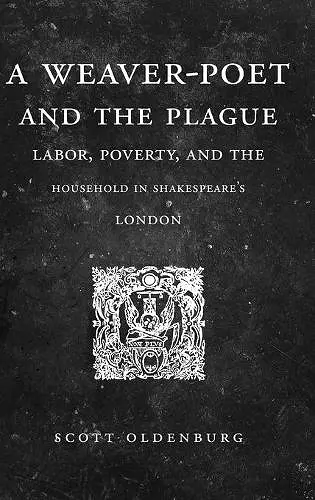A Weaver-Poet and the Plague
Labor, Poverty, and the Household in Shakespeare’s London
Format:Hardback
Publisher:Pennsylvania State University Press
Published:14th Sep '20
Should be back in stock very soon
This hardback is available in another edition too:
- Paperback£24.95(9780271087160)

William Muggins, an impoverished but highly literate weaver-poet, lived and wrote in London at the turn of the seventeenth century, when few of his contemporaries could even read. A Weaver-Poet and the Plague’s microhistorical approach uses Muggins’s life and writing, in which he articulates a radical vision of a commonwealth founded on labor and mutual aid, as a gateway into a broader narrative about London’s “middling sort” during the plague of 1603.
In debt, in prison, and at odds with his livery company, Muggins was forced to move his family from the central London neighborhood called the Poultry to the far poorer and more densely populated parish of St. Olave’s in Southwark. It was here, confined to his home as that parish was devastated by the plague, that Muggins wrote his minor epic, London’s Mourning Garment, in 1603. The poem laments the loss of life and the suffering brought on by the plague but also reflects on the social and economic woes of the city, from the pains of motherhood and childrearing to anxieties about poverty, insurmountable debt, and a system that had failed London’s most vulnerable. Part literary criticism, part microhistory, this book reconstructs Muggins’s household, his reading, his professional and social networks, and his proximity to a culture of radical religion in Southwark.
Featuring an appendix with a complete version of London’s Mourning Garment, this volume presents a street-level view of seventeenth-century London that gives agency and voice to a class that is often portrayed as passive and voiceless.
“[A] remarkable book, and the reorientation it offers is profound. Rather than zeroing in on a valued cultural object to put it in its contexts, A Weaver-Poet and the Plague radiates outward from London’s Mourning Garment and shows how scholars distribute foregrounds and backgrounds in the histories they build.”
—William N. West SEL: Studies in English Literature
“A rich and thoughtful domestic context for anyone interested in early modern plague history.”
—Lori Jones Canadian Journal of Health History
“A Weaver-Poet and the Plague interacts expertly with primary sources and secondary literature about the plague, the labor of poor men and women in early modern London, grief and gender. This original book offers a fascinating reading of the weaver William Muggins’s poem London’s Mourning Garment (1603) and a compelling microhistory of this poet in relation to his social network. Oldenburg offers a fresh perspective on a ‘nonaristocratic aesthetics’ of low and middling sorts of poets and prose writers.”
—Jennifer C. Vaught, author of Architectural Rhetoric in Shakespeare and Spenser
“Scott Oldenburg's interdisciplinary approach in A Weaver-Poet and the Plague, with its synthesis of historical detail and literary textual analysis, offers numerous insights into how plague writing related to everyday life in early modern England. The level of archival research in the manuscript, and particularly the use of parish registers, is to be applauded.”
—Kathleen Miller, Queen's University Belfast
“Oldenburg’s study is a compelling example of the benefits to be gained by attending to early modern subjects from the poorer end of the middling sort and the historical and literary traces they leave behind. Doing so, this volume demonstrates, enriches and enlivens our view of life and death in London’s parishes, and prompts reconsideration of marginal, nonelite texts that are too often read too lightly, dismissed as predictable or trite.”
—Patricia Phillippy Journal of British Studies
ISBN: 9780271087153
Dimensions: 229mm x 152mm x 25mm
Weight: 544g
284 pages